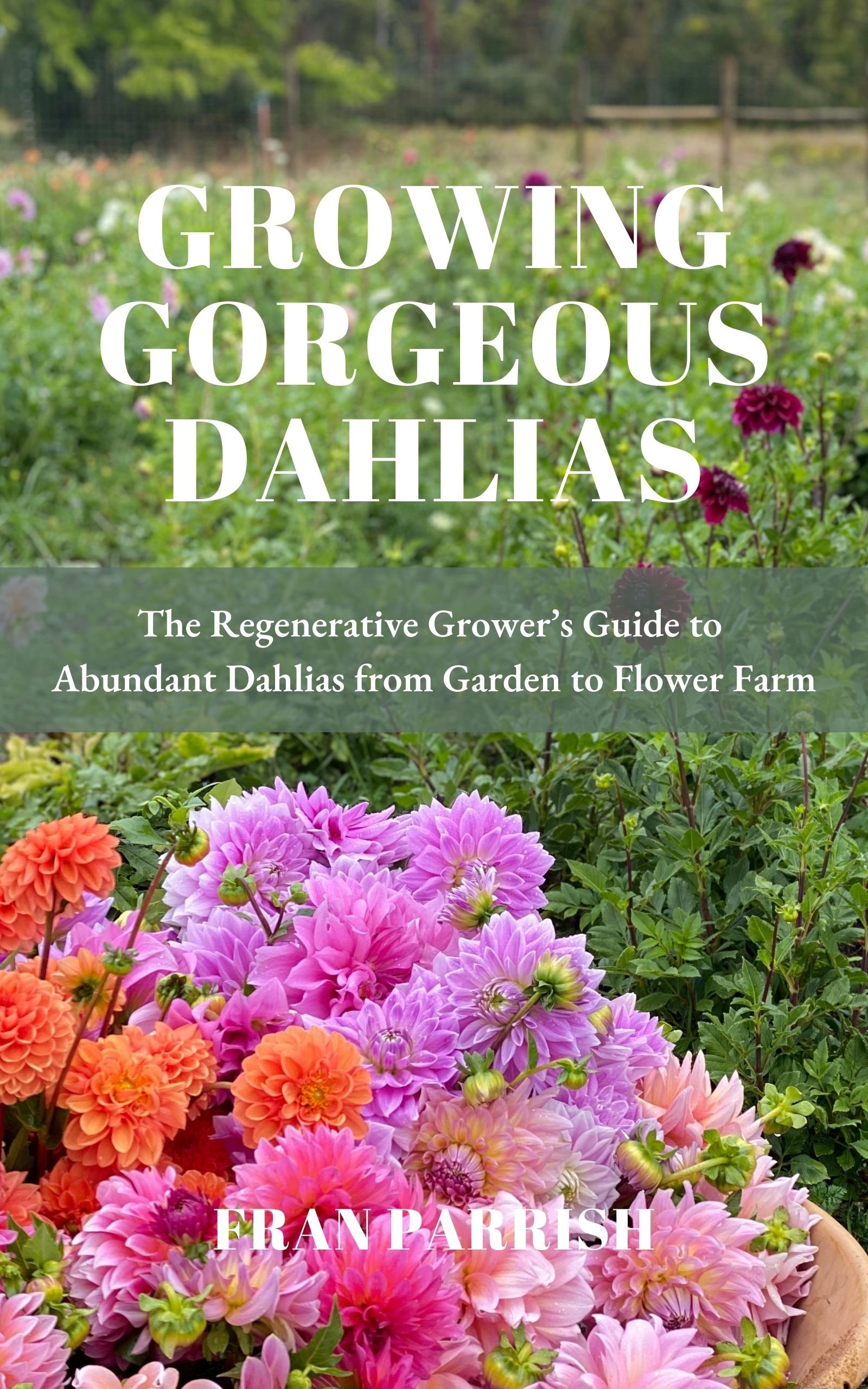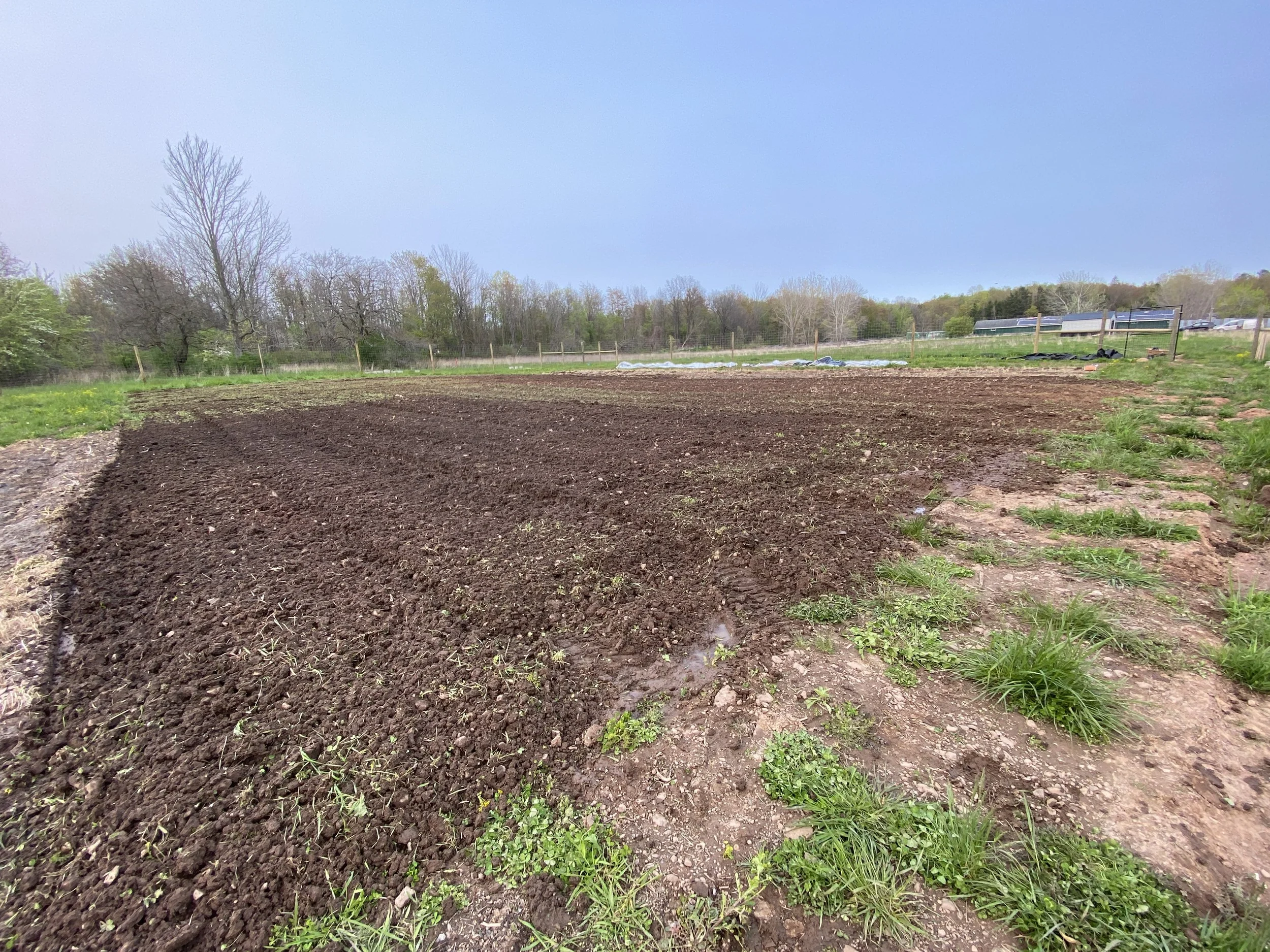Is Tilling Bad for Soil? 6 Myths About Tillage
Updated March 6, 2025
I’m going to be frank, here: Frequent tilling is widely regarded as being bad for soil.
There are a myriad of reasons why tilling ruins soil, all of which I’ve listed below, but include: breaking up soil structure, causing compaction, killing soil microbes, and releasing carbon into the atmosphere.
Despite the widespread act of tillage on both conventional and organic farms across the United States, the topic of tillage and soil health has been extensively researched and proven to be detrimental for the future of our crop systems.
There is an easy, effective way to aerate soil without using a tiller — we aerate our farm and garden soils using a Broadfork! Visit this post here to learn exactly how to aerate your soil using our no-till broadforking technique.
Low-Till vs No-Till
On my 1-acre flower farm in Burt, NY, we are a low-till flower farming operation. This means we till our soil only in order to break new ground that is covered in perennial weeds and thick grasses — a situation that would take a lot of time and labor to deal with, without tillage. Once the new ground is tilled, we form permanent no-till raised beds and never till the area again. Using this approach, we are able to quickly open new planting areas while setting up a system that builds healthy soil to feed beneficial soil microbes. The result is that our crops naturally grow big and beautiful.
Aerating soil on a yearly basis, without tilling
In my flower farm and home gardens, I have a simple, amazing soil prep procedure that includes adding shredded leaves, compost and amendments to the soil, then using a broadfork or garden fork to crack the soil open. My entire process is discussed in my brand new book: Growing Gorgeous Dahlias: The Regenerative Grower’s Guide to Abundant Dahlias from Garden to Flower Farm. The soil prep chapter is universal to all gardens, not just dahlias, so I encourage you to get a copy or suggest your library buy one for you to borrow!
For growers that do till their soil, this post may feel like a criticism or jab, but that is never my intention here. Please consider this post as a helpful, constructive suggestion from someone who has spent years of their life dedicated to growing no-till, regenerative production farms. This is an opportunity to learn about the role that soil biology plays in our gardens, and frankly, our entire lives.
Most of all, it’s important to understand why we choose no-till.
Our goal is to build soil with lots of organic matter. Here, we’ve pulled back a mulch layer of decayed leaves and straw to reveal fungal connections and earthworms.
why is tilling so bad for garden soil?
The act of tilling breaks apart soil structure and mycelial connections (such as mycorrhizal fungi), leading to compaction, flooding and soil erosion.
This is especially problematic in areas of drought. When soil structure is destroyed by tillage, organic matter and microbes are burned up. This means the soil has zero to no Soil Moisture Holding Capacity, or the ability to retain deep stores of snow melt and rainwater for later use. In drought-stricken areas (which are predicted to become more widespread), crops die, or never even germinate, from lack of water.
Tillage exposes valuable soil microbial life that is sensitive to oxygen, killing it.
When healthy microbial life is killed by tillage, crops do not have a nutrient source, nor are they able to defend themselves naturally against pathogens and pests. This lack of natural fertility requires the grower to use harmful synthetic fertilizers and pesticides to control nutrients and insects. It is costly to both the grower’s wallet and the immediate ecosystem.
Tillage releases carbon that is stored in the soil in the form of carbon dioxide, contributing to carbon emissions and the negative effects of climate change.
Tillage exposes weed seeds that have been dormant underneath layers of soil. These weed seeds explode with growth and can make an organic garden (no herbicides)
This part of our flower field was initially tilled once, then turned into permanent no-till raised beds.
6 Myths about tillage
These are common statements I hear people claim about tillage, that are not actually true.
MYTH #1 - Tilling aerates the soil in the spring
Wrong. Tilling breaks apart air and water pockets that have been naturally created by microbes, earthworms and other insects, causing compaction and lack of airflow for root systems. These creatures are natural tillers and the only tillage system you need.
MYTH #2 - Tilling makes the ground easier to work
Wrong. Tillage inevitably compacts soil to the point of it being unworkable. Then the thought is, tilling is the only way to prep every spring because the soil is so compacted. The system of tillage perpetuates itself in this way.
MYTH #3 - There’s no way I’ll be able to start a new garden unless I till it
There are several ways you can start a new garden without a tiller. Sheet Mulching and Silage Tarping are two of the best ways to get going without a tiller!
MYTH #4 - Tilling is the only way I can control weeds
No it isn’t. In fact, tilling exposes dormant weed seeds and makes your weed problems worse. Learn how to control weeds without tilling here.
MYTH #5 - Tilling is the only way I can incorporate my cover crops
Wrong. Our preferred way of terminating cover crops is to mow them down prior to seed setting, then finishing for 1-3 weeks with permeable landscape fabric or a silage tarp. Rather than incorporating into the soil, we top the cover crop residue with a layer of compost or composted manure.
Large operations (hundreds to thousands of acres) that are cover cropping would benefit from mowing or grazing livestock to lessen the cover crop height (biomass will be chopped/left behind by the mower or in the form of manure by the animals). Then, implement a seed drill right into the mowed cover crop rather than plowing. A recommended read is: Dirt to Soil: One Family’s Journey into Regenerative Agriculture by Gabe Brown. He is a pioneer of large-scale regenerative agriculture.
MYTH #6 - All farmers till their soil
Actually… Lots of us don’t! There is a whole no-till farming movement that I encourage you to delve into. Check out Farmer Jesse’s No-Till Grower’s Podcast!
To conclude… tilling should be avoided whenever possiblE
I encourage you to spend time reading books written by agronomists, biologists and practicing farmers that have real-life experience; along with scientific, peer-reviewed articles on the subject of no-till and regenerative agriculture. Here, I’ve compiled a list of my favorite Regenerative/No-Till Agriculture Books. I’ve read every book on that list, which has helped form my understanding of the information I provide in this blog post, along with 13 years of experience growing over 150 home gardens and over one dozen urban and rural vegetable and my own-operated flower farms — in both tillage and no-till settings. I’ve literally seen it all.
I hope this has shed some light on why tilling is bad for the health of our soils, or that it sparked interest in further learning. Perhaps you’ll pick up one of those books I recommended from your local library. Or, maybe you’ll even keep your tiller in the shed this season and experiment building a super healthy garden without it!
more on building healthy soil…
5 Steps to Building Healthy Organic Garden Soil + Soil Food Web, Part 2
The Difference Between Organic, No-Till, Sustainable and Regenerative Farming
Fertilizing and ‘The Law of Return’
How to Start a No-Till Sheet Mulch Garden
How to Fix Soil After Using Miracle-Gro and Other Chemical Fertilizers






